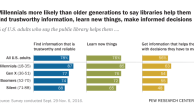One major finding in our research into Americans’ use of public libraries is the extent to which libraries are synonymous not only with knowledge and information, but with the tools needed to acquire it in the digital age. Some 77% of Americans now think it is “very important” for public libraries to provide free access to computers and the internet to the community, and 95% think it is important overall. (For comparison, 80% of Americans say that it is “very important” for libraries to provide books to the community for borrowing.)
Qualitative work with library staff members echoes these findings. “Our most popular area is the public access computers,” one librarian told us. Many emphasized that they see the role of a public library enabling access to information, regardless of format. “I believe public libraries should move away from being ‘houses of knowledge’ and move more towards being ‘houses of access,’” one wrote. “This is what the public is asking for and we are here to serve them.”
An article in the New York Times yesterday illustrated this point by exploring some of the ways that patrons of the Clason’s Point Library branch in the Bronx rely on the library’s internet access—even when the library itself is closed:
Like most homes in his part of the Bronx, Joey’s apartment has no Internet access. Even before the library opens for the day, people stand outside, polishing résumés, then dash in at the crack of 10 a.m. to use the printers. “Then they get right on the train for job interviews,” said Wanda Luzon, the manager of the Clason’s Point Branch of the New York Public Library.
Joey, 15, who is going to be a sophomore in high school, arrives at the end of the day, after he is finished at the year-round academic enrichment program he attends in Manhattan. He walks a block from the Westchester Avenue el, then settles in at the library until closing time, which is 7 p.m. on Mondays. Then he continues his online session through the library’s network.
“I’ve got an hour before sunset, when it gets dangerous,” Joey said.
As he spoke, a young woman nearby finished her online sidewalk session and moved on.
Our data shows that 91% of Americans have either used a public library at some point in their life, or say someone else in their household uses a public library. Among them, 77% of Americans who use the internet but lack home access say computer and internet access at their public library is important to them and their family—including 56% who say it is “very important.” The New York Times article also cited research from the New York Public Library which found that a majority of patrons who use the library’s internet and computers lack home internet access.
In general, Americans living in lower-income households are also more likely than those in higher-income households to say that internet access at libraries—as well as many other services—are important to them and their families (as shown in the following chart).

Currently, 75% of adults living in households earning less than $30,000 per year use the internet, but only about 52% have a broadband connection at home.



